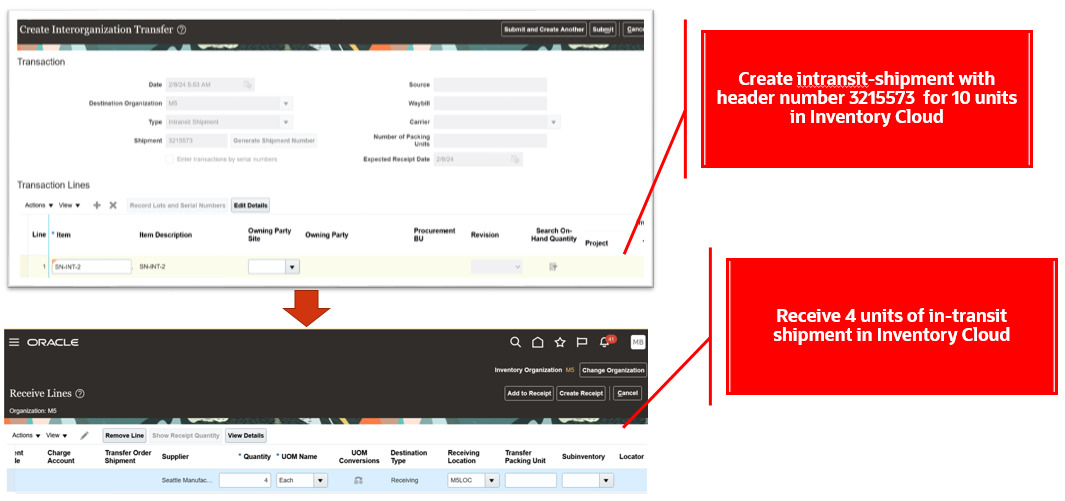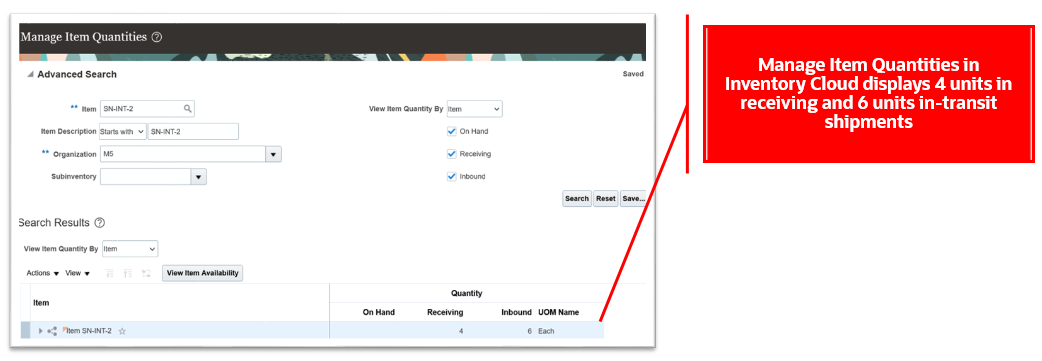Collect and Plan In-Transit Shipments Without Reference to Transfer Orders or Purchase Orders
Most businesses engage in ad hoc processes, such as shipping goods between their facilities without creating a transfer order or having suppliers ship goods without a formal purchase order. This update will now recognize these supplies as valid for planning purposes. Previously, they were only recognized after being received at the destination.
This feature allows you to:
- Collect and plan in-transit shipments from Oracle Fusion Cloud SCM that aren’t associated to a transfer order line shipment or purchase order line schedule shipment.
- Collect and plan receipts for in-transit shipments that aren’t associated to a transfer order or purchase order.
This feature is applicable to Oracle Supply Planning, Oracle Demand and Supply Planning, Oracle Sales and Operations Planning, Oracle Replenishment Planning, Oracle Backlog Management, and Oracle Global Order Promising.
Perform the following steps to collect and plan in-transit shipments that aren’t associated to a transfer order or purchase order:
- Create in-transit shipments in Oracle Fusion Cloud Inventory Management that don't have associated transfer order or purchase order. For example, use the Create Interorganization Transfer task to create in-transit shipments for on hand inventory.
- You can perform complete or partial receipts and then put away the expected inbound shipments of the in transits.

In-Transit Shipment and Its Receipts Created in Oracle Inventory Management

Manage Item Quantities in Oracle Inventory Management Displays In-Transit Shipments and Receipts
- Select Transfer Orders as Supply entity and then select Net change or Targeted collection type.
- Review the collected data in Plan Inputs work area.

Plan Inputs Displays Collected In-Transit Shipments and Receipts
- Run the plan based on collected in-transit shipments and receipts that don’t have associated transfer orders or purchase orders.
The data collection process collects adjusted in-transit shipment quantities, associated receipts and on hand at the destination organization to Oracle Supply Chain Planning. These supplies are collected with the shipment header and line numbers from Oracle Inventory Management and are planned as firm supplies in Oracle Supply Chain Planning.
Reservations are not collected and planned for these in-transit shipments and their receipts.
When planning in-transit shipments and their receipts that don't have associated transfer orders or purchase orders, the organization and carrier calendars are respected.
Steps to Enable
Use the Opt In UI to enable this feature. For instructions, refer to the Optional Uptake of New Features section of this document.
Offering: Supply Chain Planning
Tips And Considerations
- If you want to use the Collect and Plan In-Transit Shipments Without Reference to Transfer Orders or Purchase Orders feature, you must opt in to its parent feature Oracle Backlog Management. If you’ve already opted in to this parent feature, then you don’t have to opt in again.
- This feature is supported only for an Oracle Fusion Cloud SCM source system.
- You can't collect project, task, or planning attributes for in-transit shipments that don't have an associated transfer order or purchase order. These details are collected to be allocated as common supplies to attribute-based demands in Oracle Fusion Cloud Supply Chain Planning.
- Specify the shipping method while creating in-transit shipments that do not have an associated transfer order or purchase order to collect and plan in Oracle Supply Chain Planning.
Access Requirements
Users who are assigned a configured job role that contains these privileges can access this feature:
- Monitor Supply Planning Work Area (MSC_MONITOR_SUPPLY_PLANNING_WORK_AREA_PRIV)
- Monitor Demand and Supply Planning Work Area (MSC_MONITOR_DEMAND_AND_SUPPLY_PLANNING_WORK_AREA_PRIV)\
- Manage Sales and Operations Planning (MSC_MONITOR_SALES_AND_OPERATIONS_PLANNING_WORK_AREA_PRIV)
- Monitor Backlog Management Work Area (MSC_MONITOR_BACKLOG_MANAGEMENT_WORK_AREA_PRIV)
- Monitor Order Promising Work Area (MSC_MONITOR_ORDER_PROMISING_WORK_AREA_PRIV)
- Manage Replenishment Planning (MSC_MONITOR_REPLENISHMENT_PLANNING_WORK_AREA_PRIV)
These privileges were available prior to this update.